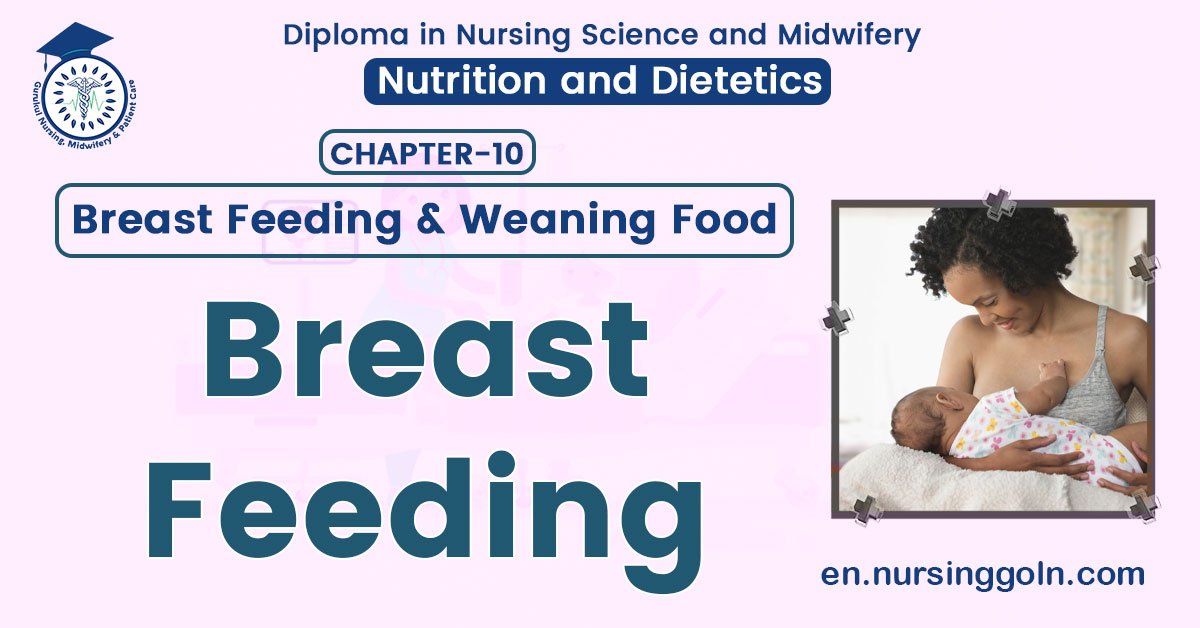Concept about Breast Feeding – This book covers the entire syllabus of “Nutrition and Dietetics” prescribed by BNMC-for all Diploma in Nursing Science and Midwifery students. We tried to accommodate latest information and topics. This book is examination friendly setup according to the teachers’ lectures and examination’s questions. At the end of the book previous university questions are given. We hope in touch with the book students’ knowledge will be upgraded and flourished. The unique way of presentation may make your reading of the book a pleasurable experience.
Concept about Breast Feeding
Breast feeding is the normal way of providing young infants with the nutrients they need for healthy growth and development. Virtually all mothers can breastfeed, provided they have accurate information, and the support of their family, the health care system and society at large.

Colostrum, the yellowish, sticky breast milk produced at the end of pregnancy, is recommended by WHO as the perfect food for the newborn, and feeding should be initiated within the first hour after birth.
Exclusive breastfeeding is recommended up to 6 months of age, with continued breastfeeding along with appropriate complementary foods up to two years of age or beyond.
Definition of Breast Feeding:
According to WHO (World Health Organization): Breastfeeding is the normal way of providing young infants with the nutrients they need for healthy growth and development. Virtually all mothers can breastfeed, provided they have accurate information, and the support of their family, the health care system and society at large.
Or,
Breast feeding is the best natural feeding and breast milk is best milk. The basic food of infant is mother’s milk. Breastfeeding is the most effective way to provide a baby with a caring environment and complete food.
Exclusive Breast Feeding:
It implies feeding of breast milk is enough for the baby up to 6 months of life and no other food is necessary during this time.
OTHER DEFINITIONS-NICE TO KNOW
Exclusive breastfeeding means that the baby has no other food or drink but breast milk -not even a ‘dummy'(pacifier). If the baby sometimes has small amounts of another food or drink-such as drinks of water or vitamin drops-he is almost exclusively breastfed.
When a baby is given only breast milk, not even a drop of water, up to 5 months of age it is called an absolute or exclusive breast feeding.
Benefits of Breast Feeding:
1. For infant:
- Breast milk is safe, clean, hygienic, cheap, and available to infant.
- It is available in prepared form in adequate temp.
- It fulfills the nutritional requirement of the infant in the first 4-5 months of life.
- It provides passive immunity to the infant, as it contains IgA, lysozyme, lactoferrin etc.
- It protects the infant from diarrhoeal diseases, night blindness
- ARI, measles etc. for few months.
- Easily digestible.
- Sucking helps in development of jaws and teeth.
- It prevents neonatal hypocalcemial & hypomagnesimia.
- It prevents malnutrition.
- It reduces IMR
- It prevents obesity of the baby.
- It promotes bonding between mother and infant.
2. For mother:
- Breast feeding prevents carcinoma of breast.
- It prevents ovulation, thus acting as contraceptive method.
- Breast feeding causes release of oxytocin- contraction of uterus- expulsion of placenta.
- Breast feeding reduces the body fat that was deposited during pregnancy.
- It promotes psychological binding between the mother & infant.

ADVANTAGES OF BREAST FEEDING -NICE TO KNOW
1. Nutritive value:
- Breast milk contains all the nutrients in the right proportion which are needed for optimum growth and development of the baby upto 4 to 6 months.
- It is essential for brain growth of the infant.
- It facilitates absorption of calcium which helps in bony growth.
- It has vitamins, minerals, electrolytes, and water in the right proportion for the infant which are necessary for the maturation of the intestinal tract.
- It provides 66 calories per 100 ml and contains 1.2g protein, 3.8 g fat and 7g lactose.
- It provides specific nutrition for preterm baby in preterm delivery.
2. Digestibility:
- Breast milk is easily digestible.
- The proteins of breast milk are mostly lacto-albumin and lacto- globulin which form a soft curd that is easy to digest.
- The enzyme lipase in the breast milk helps in the digestion of fats and provides free fatty acids.
3. Protective value :
- It provides protection against malaria and various viral and bacterial infections like skin infections, septicemia, etc.
- Breast feeding protects the infants from allergy and bronchial asthma.
- It protects against neonatal hypocalcaemia, tetany, neonatal convulsions etc.
4. Psychological benefits:
- Breast feeding promotes close physical and emotional bondage with the mother by frequent skin to skin contact, attention and interaction.
- Breast feeding promotes development of higher intelligence and feeling of security in infant.
5. Family and community benefits:
- Breast feeding is economical in terms of saving of money, time and energy
- Family has to spend less on milk, health care and illness
- Community expenditure on health care and contraception are reduced
Milk is the Ideal Food for The Baby Because:
1. Milk contains highly nutritive value
2. Easily digestable.
3. Contains protective value like-IgA, IgM, macrophages, lysozyme etc.
4. Easily available in our country.
5. Easily preparable.
Contraindications of Breast Feeding:
1. Absolute contraindication (mother):
- Infection in the breast
- Cracks fissure or inverted nipple
- Mother taking anticancer drug
- Mother having breast cancer
- Psychotic mother.
2. Infant contraindication:
- Gross prematurity
- Phenyl ketouria
- Galactosuria
Disadvantage of Breast Feeding:
1. Lactation may not be adequate
2. Mother cannot remain away from her child for a long period.
3. Social life may be upset.
4. Breast feeding may cause
- Cracked nipples
- Strepto and staphylococcal infection of breast.
- Breast abscess
5. Maternal infection may be transmitted to the baby.

Disadvantages of Bottle Feeding:
- Expensive
- Not available in prepared form in adequate temp.
- Adding of sugar and vitamin supplements are necessaries
- Parents often cannot sterilize the feeding bottle, so not safe and clean.
- No passive immunity.
- Water which is added to powder milk may not be safe
- May cause minor upset of bowel.
- Concentration of the milk may vary, as bottle feeding as artificial
Substitutes of Breast Milk:
1. Dried whole milk powder.
2. Cow’s milk.
3. Goat’s milk (in case of intolerance to cow’s milk).
4. Vegetable milk, made from soyabean.
